WAC World War II Sycamore, IL Flight date: 07/20/22
By Wendy L. Ellis, Honor Flight Chicago Veteran Interview Volunteer
As family traditions go, service to your country is a truly noble one to have. For the Burkart family of Sycamore, IL, answering the call during World War II was more than a duty. It was a strike back at an enemy that had taken one of their own on D-Day.
In 1944, Mary Catherine, known to all as “Kay” was 21 years old. She was the only girl among five brothers, and the second youngest of the clan. Three of her older brothers, Maurice, Erwin “Irv”, and Jack were either drafted or enlisted in 1942 and ‘43 and sent to all corners of the globe. Maurice was wounded, fighting in the South Pacific. Jack served with a tank corps, but was captured by the Germans in the Battle of the Bulge and spent the rest of the war in a German prison camp. But it was the loss of Irv on the beaches of Normandy on D-Day that struck at the hearts of the Burkart women, both mother and daughter.
“My mother sometimes worked two jobs to provide for the family,” says Kay Burkart. “But she wanted to be where her boys were.” So in May of 1944, just under the maximum age of 50, Kay’s mother Mary went into Chicago and signed up to serve. “I can remember my younger brother and I laughing over lunch when she went in to enlist. We laughed about mom going through the physical and going off to be a soldier. We didn’t really think she’d be accepted!”
To their surprise she was, but when word came of Irv’s death on D-Day, the Army gave Kay’s mother extra time to report for duty. That’s when Kay decided to follow her mother’s example and sign up to serve. “It was because we were mad because they took a brother that meant so much to us,” says Kay. “I wanted to be a part of it…to do whatever was needed.” So on July 27th, 1944, Kay and her mother both left for Basic Training at Fort Oglethorpe, GA. They were quite possibly one of only a few mother-daughter teams to serve together. In fact, they were both assigned to Romulus Army Air Base in Detroit, Michigan, the air transport command center where civilian pilots, many of them women, flew planes ready for combat to bases all over the country.
“I didn’t believe we’d ever get to an air base. I thought we’d end up in Georgia or Fort Bliss, OK, or some other God forsaken place,” says Kay. Her love of airplanes had led Kay to take flying lessons before the war. She never finished however, so she couldn’t be a pilot. Instead, Kay served as a clerk in the induction area of the base, living in a barracks with no showers or toilets. Using the facilities meant often racing through the cold and rainy Michigan weather whenever needed, something her mother wasn’t happy about. Her mother’s barracks had indoor plumbing, so as mothers do, she started pressuring the powers that be to move her daughter. It took a few months, but someone finally listened, and moved Kay to a better barracks. What mothers won’t do for their daughter, even in wartime.
Mother and daughter served together as PFCs until late 1945 when her father was involved in a car accident. Her mother was discharged early and went home to Sycamore, but Kay stayed on until the war was over. “Once I took the uniform off, that was pretty much it,” says Kay. “My mother, on the other hand, loved it so much I buried her in her uniform.” Kay’s mother died in 1979.
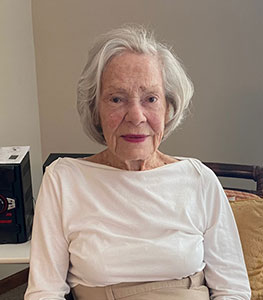
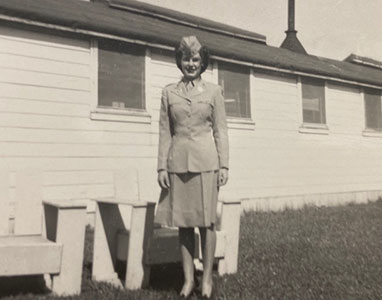
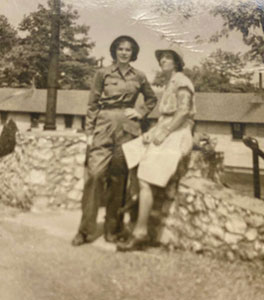
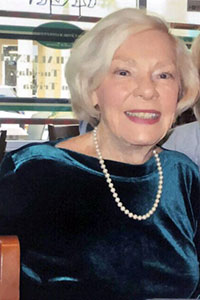
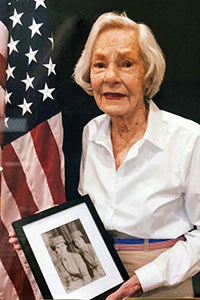
Although the Burkarts lost Irv, her other brothers came home, battered and bruised. Jack’s time in the German prison camp took its toll. “Jack never talked about it much,” says Kay. “He looked about the same as the people in the Jewish prison camps. Jack was a little feisty and did things his own way. He escaped once and was recaptured, so he was beaten. Of course that kind of treatment, coming home weighing only 100 pounds, takes a toll on the rest of your life.” Only her father and her older brother Don, who was married with 3 kids, had not signed up to serve. Her younger brother Joe enlisted in the Army reserves, but never saw active duty.
The years following the war were full of changes for Kay. She briefly modeled for the Charles A. Stevens company in Chicago, before taking a job as a ticket agent for United Airlines. When she left United, she went to Florida and got a job in reservations with National Airlines; eventually she transferred to New York City. But when she returned to Chicago in 1953, she took a job with American Airlines that lasted 25 years and took her back to New York City five years later. In NYC, she made a name for herself as one of the first women to move into sales management for American, selling the airline’s reservation system to major companies that would use it to book travel for their employees. She lived in midtown Manhattan, walking to work at the Chrysler Building, and taking advantage of all the perks so few women had advantage of in those years.
“It was a very propitious time to be a woman,” says Kay. “All the airlines were expanding at that time, but there were very few women with experience. I had worked my way up from ticket agent, through customer service, so management came to me and asked if I wanted to move into sales. It allowed me to earn a living for 25 years.”
Although she lived in midtown Manhattan for 65 years, working for an airline allowed her to return home to Sycamore so often, people thought she still lived there. Kay married in 1976, retired in 1978, and then worked with her husband, a furniture executive, until his death in 1988.
Kay celebrated her 99th birthday in February, and chose to move back to Illinois to be closer to family. The Honor Flight Chicago trip to Washington D.C. this month will afford her the chance to visit the Women’s War Memorial, where there is a picture of her and her mother in uniform, serving together.
“I feel unqualified for the attention,” says Kay. “People say that’s not the way I should look at it, because at the time that’s the only way women could serve. Today, they issue a Glock or a Carbine and you’re sent to where the bullets are flying. It makes you feel inadequate.”
But all who have served should hear the words. “Thank you, Kay Burkart, for your service.”


